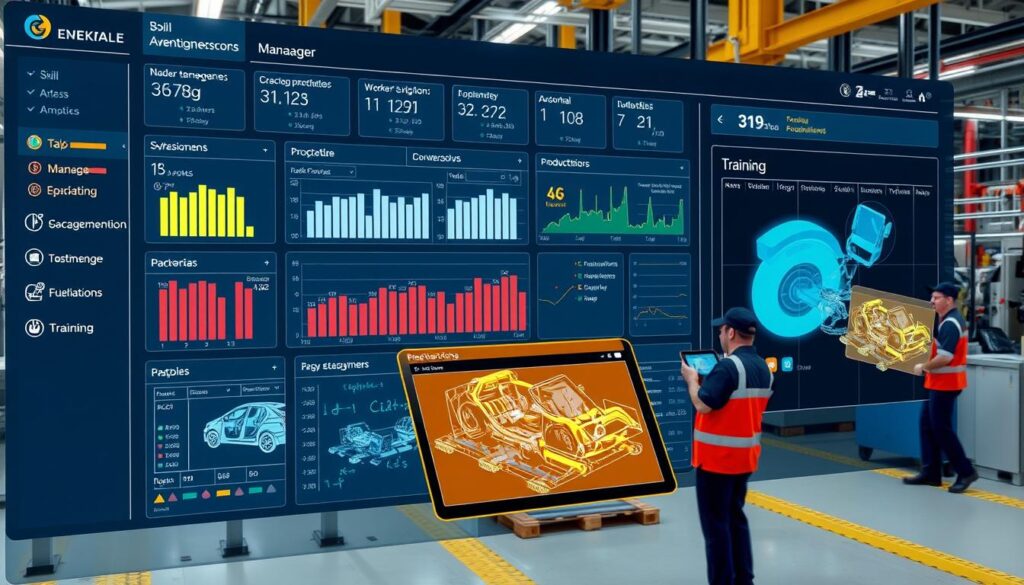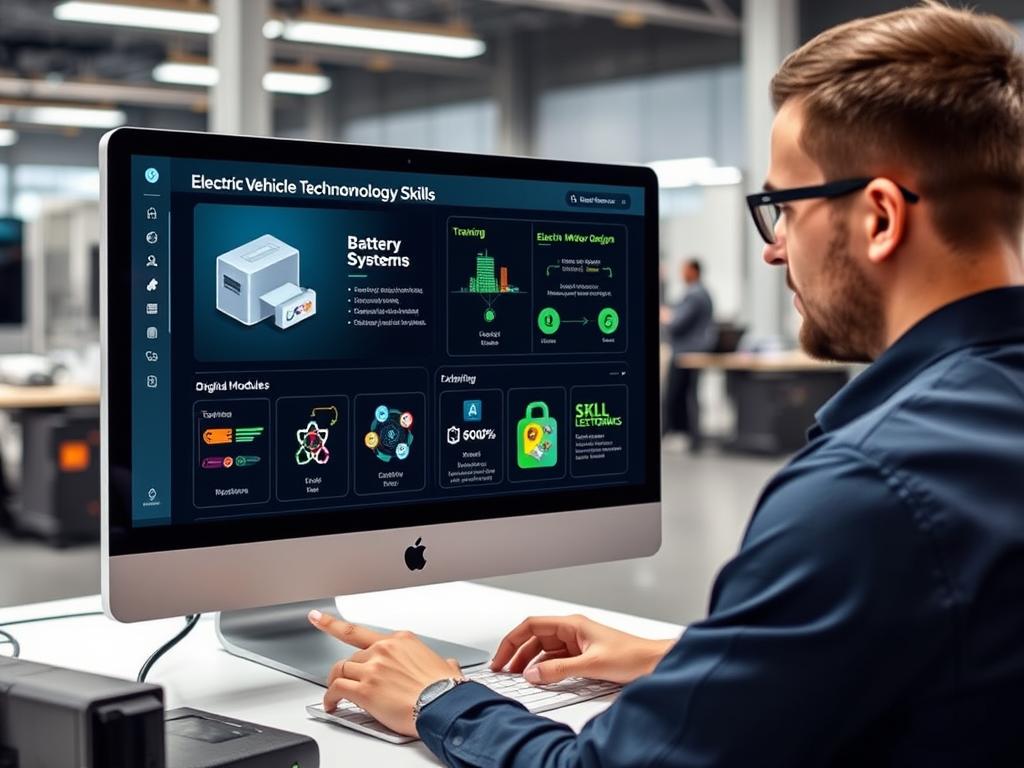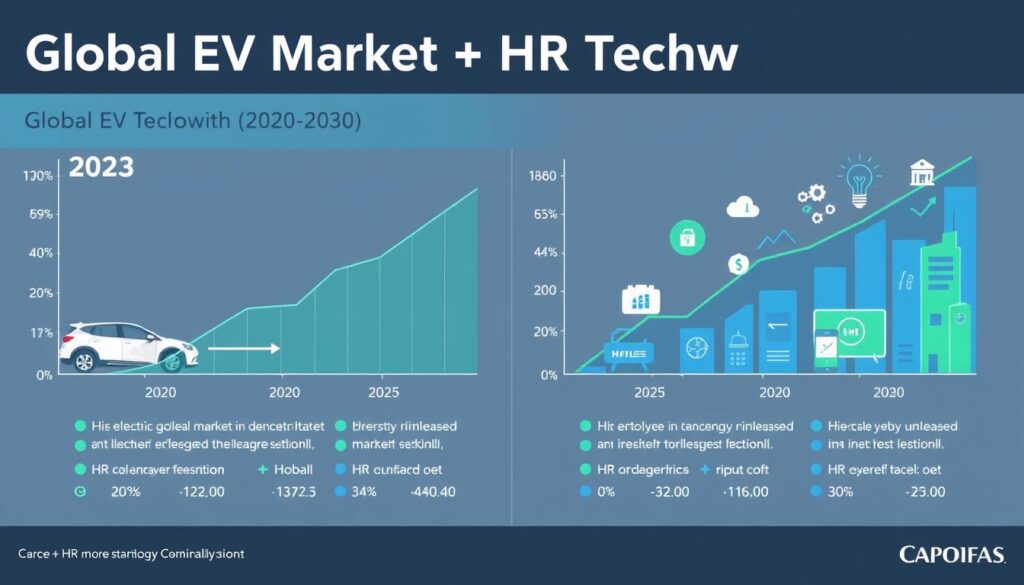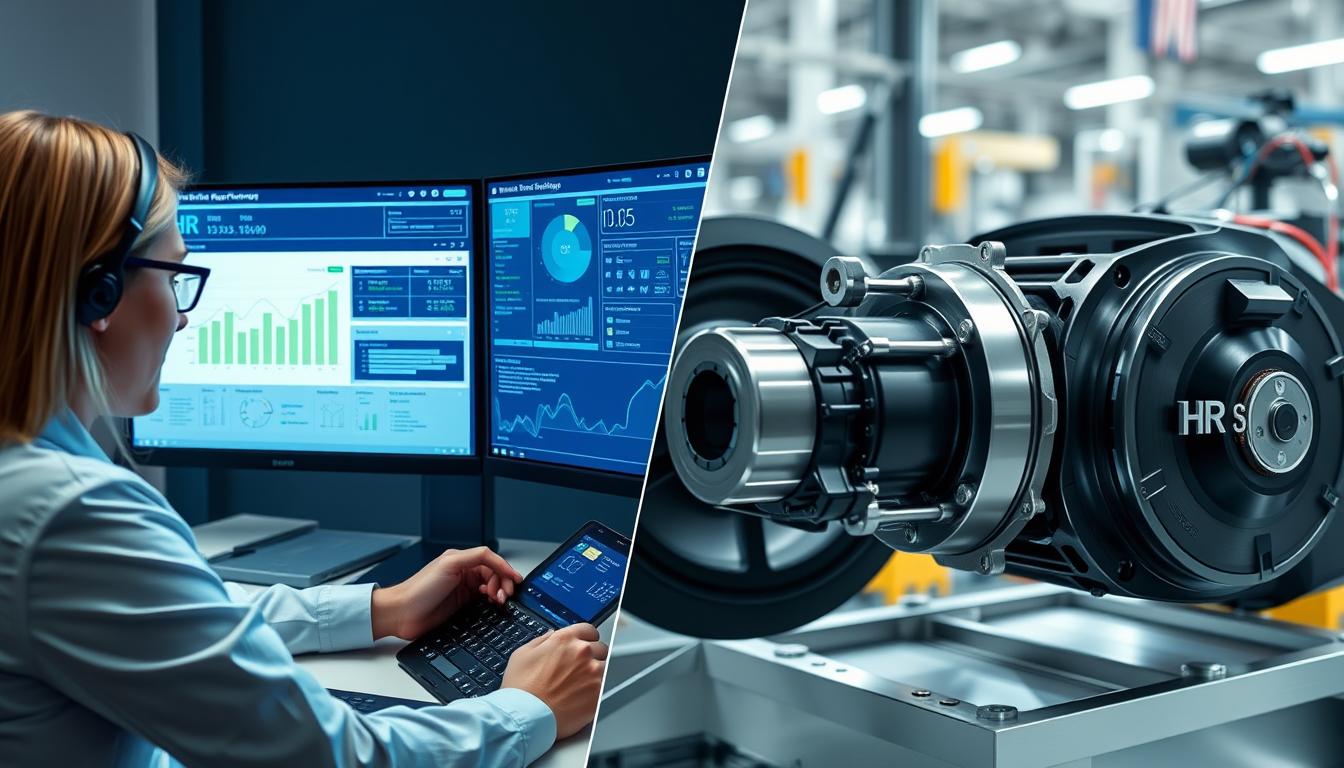The Convergence of HR Digitalization and EV Technology
The automotive industry is experiencing a profound transformation driven by electrification, requiring companies to rethink their entire approach to human resources. This shift goes beyond simply hiring engineers with different skill sets—it demands a fundamental reimagining of workforce planning, talent acquisition, and skills development.
Traditional Automotive HR Challenges
- Rigid organizational structures built around combustion engine expertise
- Legacy recruitment processes focused on mechanical engineering skills
- Training programs designed for conventional manufacturing
- Performance metrics tied to traditional automotive benchmarks
EV-Driven HR Transformation
- Agile team structures integrating software and hardware expertise
- AI-powered recruitment targeting interdisciplinary talent
- Continuous learning platforms for emerging technologies
- Performance systems measuring innovation and adaptability
This convergence creates both challenges and opportunities for organizations. Companies that successfully integrate digital HR strategies with their EV transition gain significant competitive advantages in talent acquisition, workforce development, and organizational agility.

How AI is Transforming EV Talent Acquisition
Artificial intelligence is revolutionizing how companies identify, assess, and attract talent for electric vehicle development. Advanced algorithms can now analyze vast datasets to identify candidates with the precise combination of skills needed for specific EV roles, even when those candidates may not have traditional automotive backgrounds.
Skills-Based Matching
AI systems analyze candidate profiles beyond keywords, identifying transferable skills from adjacent industries that may be valuable in EV development.
Predictive Performance
Machine learning algorithms assess candidate potential based on success patterns of existing employees in similar roles, improving hiring outcomes.
Bias Reduction
Properly designed AI recruitment tools help minimize unconscious bias in the hiring process, expanding the talent pool and increasing diversity.
“The most successful EV manufacturers aren’t just hiring different engineers—they’re using entirely different recruitment methodologies powered by artificial intelligence to identify talent that traditional approaches would miss.”
Digital Workforce Management for EV Manufacturing
Electric vehicle production requires fundamentally different manufacturing processes compared to traditional combustion engines. This shift necessitates new approaches to workforce management, training, and operational efficiency.

Key Digital Workforce Management Innovations
Real-Time Skill Mapping
Digital platforms now enable managers to visualize team skill distributions in real-time, identifying gaps and opportunities for cross-training. This capability is particularly valuable in EV manufacturing, where rapid technological changes require continuous workforce adaptation.
Predictive Workforce Analytics
Advanced analytics tools help HR leaders forecast future talent needs based on production schedules, technological roadmaps, and market trends. These insights enable proactive recruitment and training initiatives aligned with strategic business objectives.
Digital Learning Ecosystems
Personalized learning platforms deliver targeted training modules to workers based on their current roles, skill gaps, and career aspirations. These systems are essential for upskilling existing automotive workers for the EV transition.
Performance Optimization Systems
Data-driven performance management tools provide continuous feedback and coaching opportunities, helping workers adapt to the precision requirements of electric vehicle assembly.
Industry Insight: Leading EV manufacturers are achieving up to 37% higher productivity by implementing digital workforce management systems that integrate skills development, performance optimization, and predictive analytics.
Global EV Trends and HR Implications
The electric vehicle revolution is unfolding at different rates across global markets, creating varied HR challenges and opportunities. Understanding these regional differences is essential for companies developing international talent strategies.

| Region | EV Market Growth | Key HR Challenges | Digital HR Adoption | Talent Strategy Focus |
| Europe | Rapid (42% YoY) | Transitioning traditional auto workforce | High | Reskilling existing talent |
| North America | Moderate (28% YoY) | Competition with tech sector | Medium-High | Software integration expertise |
| China | Very High (56% YoY) | Scaling production workforce | High | Battery technology specialists |
| Southeast Asia | Emerging (35% YoY) | Building specialized talent pools | Medium | Manufacturing expertise |
| India | Accelerating (47% YoY) | Developing technical education | Medium-Low | Engineering talent development |
Regional HR Digitalization Strategies
Companies must adapt their HR digitalization approaches to account for regional differences in talent availability, regulatory environments, and technological infrastructure. What works in one market may not be effective in another.
Need Personalized Guidance?
Our experts can help you develop a tailored HR digitalization strategy for your specific markets and EV technology focus.
Case Study: Integrated HR-EV Transformation
The following case study demonstrates how one global automotive manufacturer successfully integrated HR digitalization with their electric vehicle technology transition, creating a template for effective organizational transformation.

ElectroDrive Motors: Workforce Transformation
Challenge: A traditional automotive manufacturer with 50,000+ employees needed to transition 40% of its workforce to electric vehicle production within three years while maintaining operational excellence.
Digital HR Solutions Implemented:
- AI-powered skills assessment platform to map existing workforce capabilities
- Predictive analytics system to identify retraining candidates vs. new hire needs
- Digital learning ecosystem with personalized EV technology training paths
- Virtual reality training environments for battery assembly procedures
- Performance management platform aligned with EV production metrics
Results:
Key Insight: The integration of HR digitalization with EV technology transformation enabled ElectroDrive to achieve its transition goals 15 months ahead of schedule while reducing anticipated recruitment costs by 32%.
Digital Skills Development for the EV Workforce
The transition to electric vehicle technology requires a fundamental shift in workforce skills. Digital learning platforms are playing a crucial role in bridging this skills gap efficiently and effectively.

Critical EV Workforce Skills
Technical Skills
- Battery management systems
- Power electronics engineering
- Electric motor design
- Thermal management systems
- High-voltage safety protocols
Digital Skills
- Software development for EVs
- Data analytics and visualization
- IoT and connected vehicle systems
- Cybersecurity for vehicle systems
- Digital twin simulation
Cross-Functional Skills
- Systems integration thinking
- Sustainable manufacturing practices
- Agile project management
- Cross-disciplinary collaboration
- Innovation methodologies
Digital Learning Approaches for EV Skills
Leading organizations are implementing innovative digital learning solutions to develop these critical skills at scale. These approaches combine technology, pedagogy, and performance support to accelerate workforce transformation.
Microlearning for Technical Skills
Bite-sized learning modules delivered via mobile devices allow workers to develop specific technical skills during production downtime. These modules use video demonstrations, interactive simulations, and knowledge checks to build competency in areas like battery management and power electronics.
AR/VR for Safety and Assembly
Augmented and virtual reality training environments provide immersive learning experiences for high-voltage safety procedures and precision assembly techniques. These technologies allow workers to practice in risk-free environments before working on actual EV components.

Remote Workforce Management for Global EV Development
The development of electric vehicle technology often involves distributed teams collaborating across different geographies. Digital HR tools are enabling effective management of these remote and hybrid workforces.

Digital Tools for Remote EV Teams
Specialized digital platforms are emerging to support the unique needs of distributed teams working on electric vehicle development. These tools combine project management, communication, and technical collaboration features.
Virtual Design Studios
Cloud-based platforms allow engineers in different locations to collaborate on EV designs in real-time, with specialized tools for battery configuration, thermal modeling, and performance simulation.
Digital Twin Collaboration
Remote teams use digital twin technology to virtually test and refine EV components, enabling efficient iteration without physical prototyping for every change.
Remote Performance Management
AI-powered analytics tools help managers assess team performance across locations, identifying bottlenecks and optimizing resource allocation for maximum productivity.
“The companies leading the EV revolution aren’t just developing better batteries—they’re creating entirely new ways of working that leverage digital tools to connect global talent ecosystems.”
Data-Driven HR Strategies for EV Manufacturers
Advanced analytics and big data are transforming how EV manufacturers approach workforce planning, talent acquisition, and performance management. These data-driven approaches enable more precise and effective HR strategies.

Key Applications of HR Analytics in EV Manufacturing
Predictive Workforce Planning
Advanced algorithms analyze market trends, production forecasts, and skill requirements to predict future talent needs with unprecedented accuracy. These insights enable HR leaders to develop proactive recruitment and training strategies aligned with business objectives.
Talent Acquisition Optimization
Data analytics tools evaluate the effectiveness of different recruitment channels, messaging approaches, and candidate assessment methods. This continuous optimization improves the quality and efficiency of hiring for specialized EV roles.
Performance Pattern Recognition
Machine learning systems identify patterns in high-performing teams and individuals, providing insights that help managers replicate success across the organization. These patterns often reveal unexpected combinations of skills and work approaches that drive innovation.
Retention Risk Prediction
Predictive models assess flight risk for critical talent, enabling proactive retention strategies for key EV specialists. These models consider factors like market demand, compensation competitiveness, and engagement indicators.
Implementation Insight: Organizations that implement data-driven HR strategies report 41% higher success rates in critical EV role recruitment and 28% improved retention of specialized battery technology experts.
Sustainable HR Practices for the EV Industry
As companies develop sustainable transportation solutions, many are aligning their HR practices with these same environmental values. Digital HR tools are enabling more sustainable workforce management approaches.

Digital HR Sustainability Initiatives
Paperless HR Processes
Digital document management systems eliminate paper-based HR processes, reducing environmental impact while improving efficiency and data security.
Virtual Recruitment
Remote interviewing and assessment tools reduce travel-related carbon emissions while expanding access to global talent pools.
Flexible Work Policies
Digital workforce management platforms enable flexible and remote work arrangements that reduce commuting impact while improving work-life balance.
These sustainable HR practices not only reduce environmental impact but also strengthen employer branding, helping EV manufacturers attract environmentally conscious talent who share their values.
Implementation Challenges and Solutions
While the benefits of integrating HR digitalization with EV technology development are clear, organizations face significant challenges in implementation. Understanding these challenges and proven solutions is essential for successful transformation.

Implementation Challenges
- Legacy systems integration with new digital HR platforms
- Resistance to change from traditional automotive workforce
- Skills gap in HR teams for digital transformation
- Data security and privacy concerns
- Measuring ROI of integrated HR-EV initiatives
- Balancing short-term production needs with long-term transformation
Proven Solutions
- Phased implementation approach with API-first integration strategy
- Change management programs with clear communication of benefits
- Digital upskilling programs for HR professionals
- Comprehensive data governance frameworks and security protocols
- Balanced scorecard approach with leading and lagging indicators
- Strategic workforce planning with scenario modeling capabilities
Overcome Implementation Barriers
Our experts can help you navigate the challenges of integrating HR digitalization with your EV technology roadmap.
Future Trends at the Intersection of HR and EV Technology
The integration of HR digitalization and electric vehicle technology will continue to evolve, with several emerging trends poised to shape the future of work in the automotive industry.

Emerging Trends to Watch
AI-Driven Workforce Ecosystems
Advanced AI systems will orchestrate dynamic workforce ecosystems that blend employees, contractors, and automation to optimize productivity and innovation in EV development.
Quantum Computing for HR
Quantum computing applications will enable unprecedented workforce modeling capabilities, simulating countless scenarios to identify optimal organizational structures for EV innovation.
Blockchain Credential Verification
Blockchain technology will streamline verification of specialized EV skills and certifications, creating trusted credential networks that accelerate hiring for critical roles.
How will autonomous vehicle development impact HR requirements?
As autonomous driving technology advances, HR departments will need to recruit even more specialized talent in areas like computer vision, machine learning, and ethical AI development. This will require increasingly sophisticated digital recruitment and assessment tools capable of evaluating these highly technical skills.
What role will digital twins play in workforce development?
Digital twin technology will increasingly be applied to workforce modeling, creating virtual representations of teams and organizations that can be used to simulate different structures, workflows, and training approaches. This will enable more precise optimization of human capital for EV development and manufacturing.
Conclusion: Preparing for the Dual Transformation
The convergence of HR digitalization and electric vehicle technology represents a pivotal moment for the automotive industry and adjacent sectors. Organizations that successfully navigate this dual transformation will gain significant competitive advantages in talent acquisition, workforce development, and operational efficiency.
Key Takeaways for Business Leaders
- Integrate HR digitalization strategy with EV technology roadmap for aligned transformation
- Leverage AI-powered recruitment to identify and attract interdisciplinary talent
- Implement digital learning ecosystems to develop critical EV-specific skills at scale
- Adopt data-driven HR approaches to optimize workforce planning and performance
- Embrace sustainable HR practices that align with EV environmental values
- Prepare for emerging trends that will further transform the intersection of HR and EV technology
At HaloHREV Tech, we specialize in helping organizations navigate this complex transformation journey. Our expertise in both HR digitalization and electric vehicle technology enables us to provide integrated solutions that drive sustainable competitive advantage.
